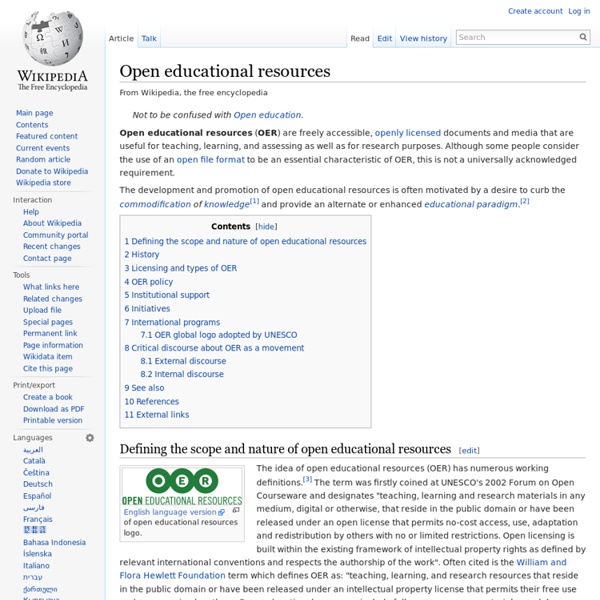Open educational resources

Creative Commons Sverige
A high school course of study with free, quality learning materials. - Charlotte Homeschooling
(This article was last updated on 1/11/13. For continued updates, please sign up for my free monthly newsletter.) I've been compiling a list of links to free resources on the web that I use myself or that have been recommended. As I'm sure you all know, buying curriculum, especially at the high school level, can amount to hundreds of dollars per course. For many families, this can be cost-prohibitive, especially If you have more than one child in the upper grades. I try to mix and match as much as possible, carefully picking and choosing what I buy, and using free material if I can find it. Fortunately, "free" does not mean you have to compromise on quality. I thought I would share what I have to try to cut down on the time we all spend searching. First, some links to sites that offer free material in a wide array of core and elective subjects. For a list of 150 free textbooks, click here. Okay, onto the specifics for North Carolina. I will continue to add to this list. 10th Grade Lit/Comp
50 Really Cool Online Tools for Science Teachers
A 21st-century education revolves around the Internet for everything from collaboration, tools, lessons, and even earning degrees online. If you are looking for ways to integrate online learning into your science class or science degree programs, then take a look at these cool online tools that are just perfect for both teachers and students. Science Tools to Use with Students These tools offer opportunities for learning about climate, cells, the human body, nature, and more. ChemiCool. AP Tools Whether you are setting up a new AP curriculum or are just looking for additional material to use with your AP science students, these tools will help. Advanced Placement Biology. Websites and Resources for Science Teachers These websites are chock full of amazing resources and tools for science teachers. Discovery Education. Calculators Use these informative environmental calculators with your students. Ecological Footprint Quiz. Online Games Online Science Games. Google Earth Google Earth Ocean.
The Biology Corner
BiologyJunction
What is science?
The word "science" probably brings to mind many different pictures: a fat textbook, white lab coats and microscopes, an astronomer peering through a telescope, a naturalist in the rainforest, Einstein's equations scribbled on a chalkboard, the launch of the space shuttle, bubbling beakers …. All of those images reflect some aspect of science, but none of them provides a full picture because science has so many facets: Science is both a body of knowledge and a process. In school, science may sometimes seem like a collection of isolated and static facts listed in a textbook, but that's only a small part of the story. Just as importantly, science is also a process of discovery that allows us to link isolated facts into coherent and comprehensive understandings of the natural world. Science is exciting. This section describes what makes science science. Or just click the "Next" button to dive right in!
Khan Academy
Free video lectures,Free Animations, Free Lecture Notes, Free Online Tests, Free Lecture Presentations
Related:
Related:



